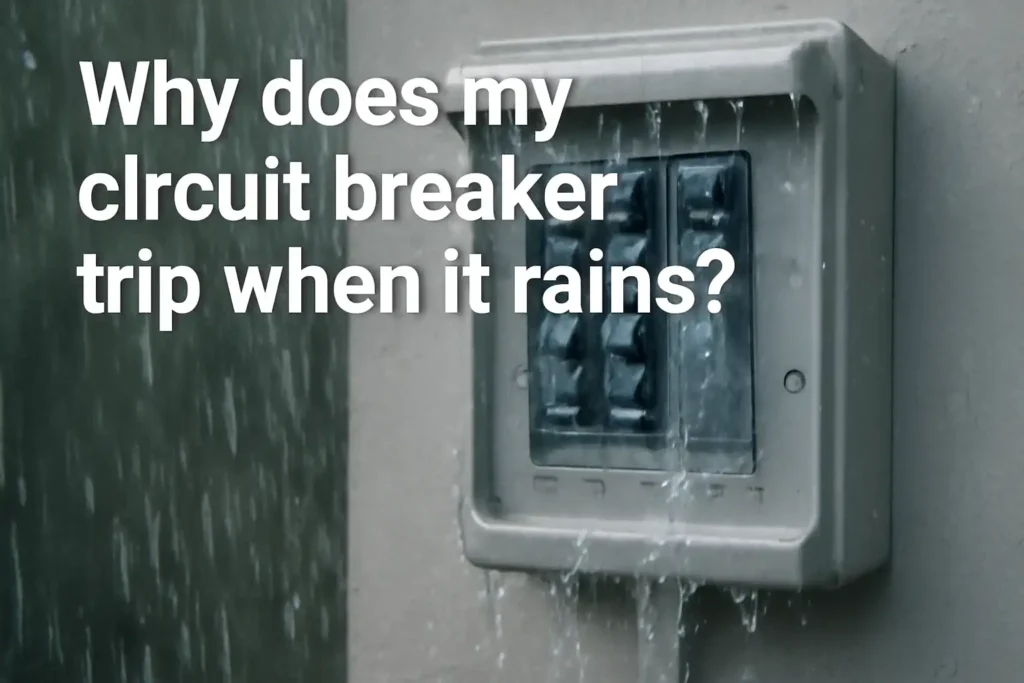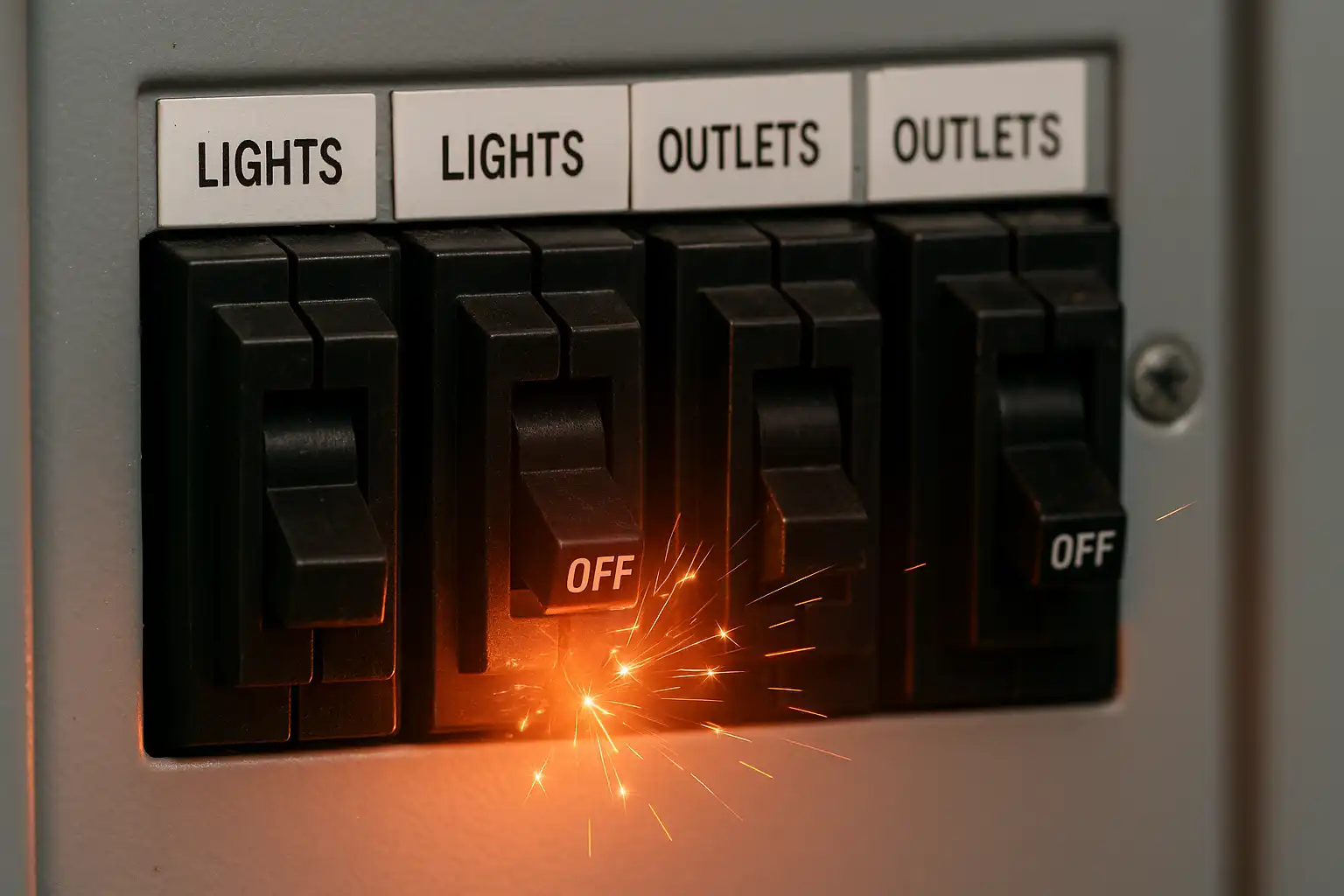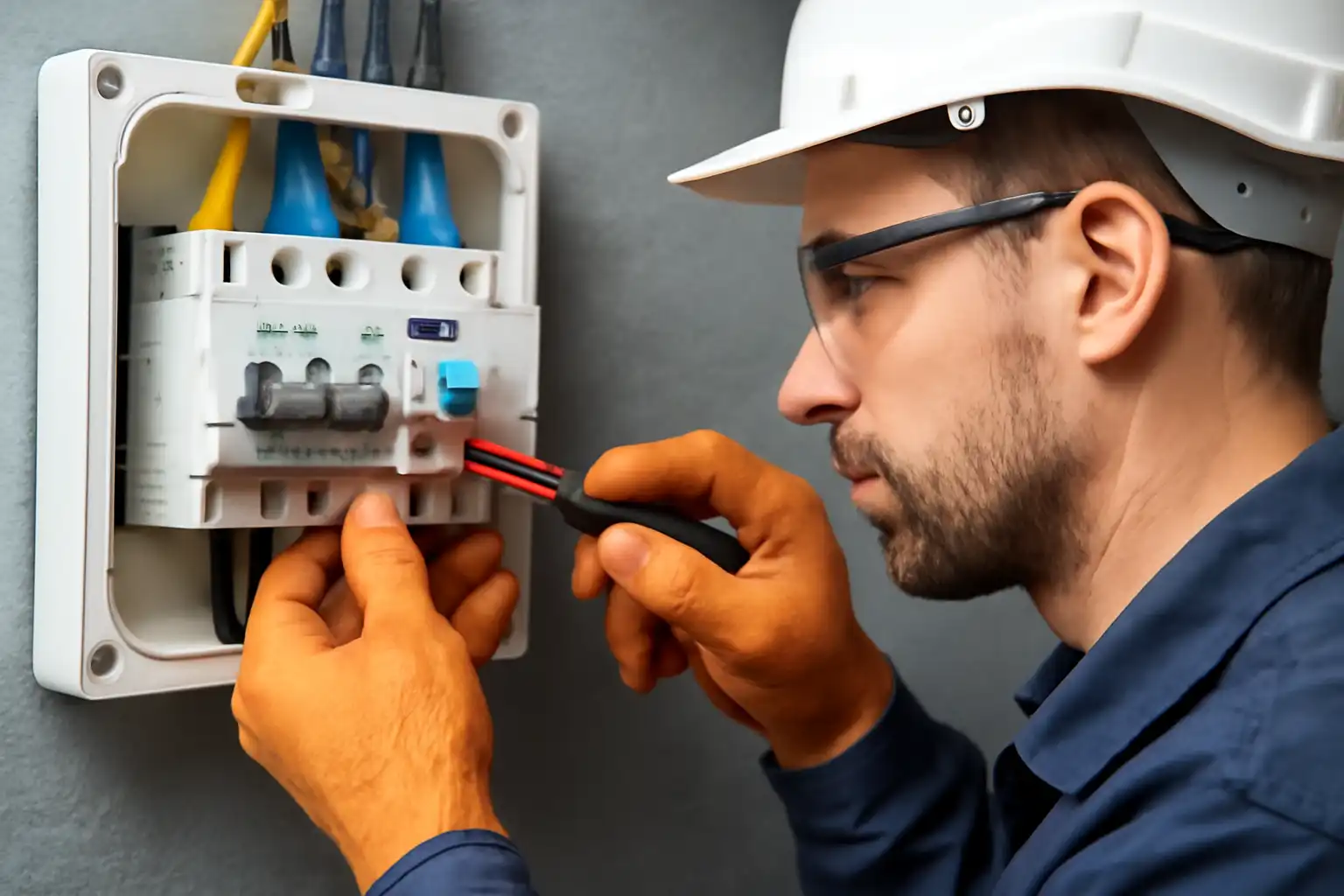When it rains, water can get into outdoor electrical systems. This can cause big problems. Moisture can damage insulation in underground cables. This may lead to short circuits. Flooding can harm transformers and weaken pole bases. This increases the chance of electrical faults. Water in panels or link boxes can cause ground faults. This makes your circuit breaker shut off. These problems make your system unsafe and unreliable. It is important to fix water issues quickly.
Key Takeaways
- Rainwater can get into outdoor outlets and lights. This may cause short circuits. Seal these spots to stop water issues.
- Look at underground wires for damage. Broken insulation or rust can trip breakers. Fix problems as soon as you see them.
- Put weatherproof covers on outdoor outlets. These keep rain out and protect your electrical system.
- Add GFCI outlets in wet places. They shut off power if water is found, preventing shocks.
- Check your electrical panels and wires often. Finding problems early saves money and keeps your home safe.
Common Reasons Breakers Trip When It Rains
Water getting into outdoor outlets or lights
Rain can sneak into outdoor outlets or lights if they aren’t sealed well. When water gets inside, it messes up the flow of electricity. This can cause short circuits or ground faults, making your breaker shut off.
Water and Electricity Don’t Mix!
Electricity always looks for the easiest path to travel. When water gets involved, that path can change. Rain can seep into outdoor outlets, open wires, or poorly sealed panels. This can lead to short circuits or ground faults, which trip your breaker.
Outdoor outlets and lights are at risk during heavy rain. Without proper covers or seals, water can easily get in. This is why breakers often trip more when it rains.
Broken or exposed underground wires
Underground wires are made to handle tough weather, but they can wear out over time. When this happens, water can leak in, causing rust or ground faults. These problems might make your breaker trip without warning.
Water can also harm the insulation on underground cables. Damaged insulation raises the chance of short circuits, which can make your system unsafe. Circuit breakers with electronic parts are especially sensitive to water. Dirty water can make these parts stop working properly.
Keeping underground wires in good shape is key to a safe system. If you think there’s damage, fix it quickly to avoid bigger issues.
Leaky electrical boxes or panels
Electrical panels are built to keep water out, but bad seals can let it in. Water inside a panel can create new paths for electricity, leading to short circuits or overloads.
Older or poorly installed panels are more likely to leak. Rain can get into panels in basements, garages, or outside walls. Over time, this water can rust wires and weaken breakers.
- Short circuits can cut power or make devices act weird.
- Rusty wires can break and cause equipment to fail.
- Bad seals make it easier for water to get inside.
Checking your panels regularly can help catch problems early. Fixing weak spots can stop leaks before they cause trouble.
Faulty or outdated weatherproofing on outdoor components
Outdoor electrical parts like outlets and light fixtures are made to handle weather. But old or damaged weatherproofing can let water in. Rainwater can enter these parts, mess up electricity, and trip your circuit breaker.
Rubber seals and gaskets wear out over time. Sunlight, heat, and age can cause cracks or gaps. These gaps let water inside, which can lead to short circuits or ground faults.
Tip: Check outdoor outlets and fixtures often for damage. Look for cracked seals, loose covers, or rust. Replace worn weatherproofing to avoid expensive repairs later.
Newer weatherproof covers, called “in-use” covers, work better than older ones. They protect outlets even when something is plugged in. Switching to these covers can lower the risk of water problems.
Frayed extension cords or improperly installed cables
Extension cords and cables are useful outside but can be dangerous if damaged. Frayed cords or bad installations expose wires to water. Rain can touch these wires, causing short circuits or even fires.
Bad setups, like cables in flood-prone areas, increase damage risks. Cables left on the ground wear out faster from water and pressure.
- Signs of frayed cords or bad installation:
- Cracks or splits in the cord’s cover.
- Copper wires showing through.
- Cords that feel hot when used.
Use cords made for outdoor use to stay safe. These cords resist water and tough conditions. Don’t overload cords, as it makes them wear out faster. Replace damaged cords right away.
Warning: Don’t fix frayed cords with tape or glue. This is unsafe in wet conditions and can cause accidents.
Fixing these problems helps protect your system and stops breaker trips during rain.
How to Stop Breaker Trips During Rain
Check and seal outdoor outlets and fixtures
Outdoor outlets and fixtures often face rain directly. If they aren’t sealed well, water can get inside and cause problems. Check these areas often for cracks, loose covers, or gaps. Even small openings let water in, which can lead to short circuits or ground faults.
To stop this, use waterproof sealant around outlets and fixtures. Replace broken gaskets or rubber seals. Adding GFCI (Ground Fault Circuit Interrupter) outlets is also very important. These outlets sense water-related issues and turn off power to keep you safe.
- Why sealing helps:
- Keeps water out of outdoor outlets.
- Lowers the chance of breaker trips.
- Prevents dangerous electrical problems.
Tip: Check outlets before rainy seasons start. This can save you money on repairs later.
Use weatherproof covers and enclosures
Regular outlet covers may not block heavy rain well. Switching to weatherproof covers, like “in-use” covers, helps a lot. These covers protect outlets even when something is plugged in, keeping water out and your system safe.
You can also add weatherproof enclosures for outdoor panels and junction boxes. These enclosures are made to handle bad weather. They stop water from reaching important parts, reducing breaker trips.
- Why weatherproofing matters:
- Shields outlets and panels from rain.
- Makes outdoor electrical parts last longer.
- Cuts down on electrical problems during storms.
Note: Pick covers and enclosures made of strong materials like plastic or metal. These last longer and work better.
Look for and fix damaged wiring
Broken wires often cause problems when it rains. Frayed insulation, exposed wires, or rusted connections let water mess with your system. Check all visible wires, especially outside, for damage. Underground cables wear out faster, so inspect them closely.
If you find damage, fix or replace the wires right away. Use waterproof connectors and heat-shrink tubing to protect repairs. For underground cables, make sure they’re insulated and buried deep enough to avoid future issues.
- Signs of bad wiring:
- Rust or discoloration on wires.
- Cracks or splits in insulation.
- Sparks or strange noises when the circuit is on.
Warning: Don’t try to fix wiring yourself unless you’re trained. Call a licensed electrician for big repairs.
By following these tips, you can stop your breaker from tripping during rain. Regular checks and upgrades make your system safer and more reliable in wet weather.
Install or replace GFCI outlets for added safety
GFCI outlets are important for outdoor and wet places. They stop electrical shocks by cutting power when water causes problems. If your outdoor outlets don’t have GFCI protection, adding them can lower the chance of breaker trips.
Putting in GFCI outlets is simple but needs care. Make sure the outlet fits your circuit and is placed where moisture is common. For instance, outdoor outlets near sprinklers or rain should always have GFCI protection.
Tip: Test GFCI outlets every month using the “Test” and “Reset” buttons. This helps ensure they work well against water-related issues.
If you already have GFCI outlets, check them for damage. Old outlets might not work as well over time. Replacing them with newer ones makes your system safer and more reliable.
- Benefits of GFCI outlets:
- Stop shocks caused by water.
- Lower the chance of breaker trips in storms.
- Improve safety in wet areas.
When it rains, GFCI outlets protect you from electrical dangers. Upgrading to these outlets keeps your system safe and working, even in bad weather.
Ensure proper drainage around electrical panels
Water near electrical panels can cause big problems. Pooled water raises the risk of leaks and rust. Good drainage keeps water away and protects your system.
Check the area around your electrical panel for water buildup. Look for wet soil or puddles. If you see these, fix drainage by sloping the ground or adding a drain system.
Warning: Don’t ignore water near electrical panels. Even small amounts can cause rust, short circuits, or other issues.
Adding a waterproof cover around the panel also helps. Use enclosures to block rain and moisture. These covers work best with proper drainage.
- Steps to improve drainage:
- Clean gutters and downspouts to move water away.
- Add a French drain or gravel trench near the panel.
- Make sure the ground slopes away from the panel.
Good drainage keeps your system safe and stops breaker trips. Regular checks help keep your panel dry and working, even in heavy rain.
What to Do When Your Breaker Trips During Rain
Turn off all appliances and devices on the affected circuit
If your breaker trips during rain, turn off everything on the circuit. This stops more damage and lowers the chance of shocks. Unplug lamps, chargers, and kitchen tools. Disconnect outdoor equipment too if it’s connected.
Tip: Keep a flashlight nearby during storms. It helps you unplug safely if the power goes out.
Turning off devices helps you find the problem faster. Once the circuit is clear, you can check for issues without worrying about extra electrical trouble.
Check for visible signs of water intrusion or damage
Look for water or damage near outlets, fixtures, and panels. Check for rust, discoloration, or moisture. Outdoor parts are more likely to get wet, so inspect them closely.
If you see water near panels or dripping from outlets, don’t touch them. Water carries electricity and can be dangerous. Dry the area with a towel or fan only if it’s safe.
Incident Example: On May 29, 2020, a PG&E outage caused well pumps to trip their circuit breaker. Water pressure came back after resetting the pumps. This shows why checking for water problems is important.
Checking for damage helps you know if water caused the trip or something else. If there’s serious damage, call an electrician to fix it.
Reset the breaker and monitor for recurring trips
After checking for damage, reset the breaker. Find the panel and switch the tripped breaker back to “on.” If it trips again right away, stop using the circuit and check further.
Watch the circuit for repeated trips. If the breaker stays on, plug in devices one by one. This helps you find if one device is causing the issue.
Warning: Don’t force a breaker to stay on if it keeps tripping. This can cause fires or overheating.
Rain can cause temporary problems that go away when things dry. But if the breaker keeps tripping, it might be a bigger issue that needs expert help.
Don’t use the circuit if the problem continues
If your circuit breaker keeps shutting off during rain, stop using it right away. Frequent trips mean there’s a serious problem that could be dangerous. Using the circuit might cause sparks, overheating, or even fires.
⚠️ Important: Never try to force a breaker to stay on. Breakers trip to protect your home from electrical damage.
A bad circuit can also harm your devices. Unstable electricity can damage items like TVs, computers, or kitchen tools. Unplug everything connected to the circuit to avoid more problems.
Here’s what you should do instead:
- Keep the breaker off: Leave the breaker in the “off” position until the issue is fixed. This stops electricity from flowing through the damaged circuit.
- Don’t use extension cords as a solution: Plugging devices into other circuits with extension cords can overload them and cause new issues.
- Check for water nearby: Look for water near outlets, panels, or fixtures. If it’s safe, dry the area to prevent further damage.
💡 Tip: Use flashlights or battery-powered gadgets while waiting for repairs.
Ignoring a tripping breaker can make the problem worse. If drying or troubleshooting doesn’t help, call an electrician. They can find the problem and make sure your system is safe again.
By not using the circuit, you keep your home and family safe. Always choose safety over convenience when dealing with electrical problems.
When to Call a Professional Electrician
Persistent breaker trips despite troubleshooting
If your breaker keeps shutting off after basic checks, call an electrician. Repeated trips often mean serious electrical problems. These could include bad wiring or faulty connections. Ignoring these issues might cause overheating or fires.
Electricians are trained to find and fix hidden problems. They check for damaged circuits or overloaded panels. Burning smells, strange sounds, or visible damage need expert attention. Professionals follow safety rules to keep your home safe and up to code.
⚠️ Important: Never force a breaker to stay on. It trips to protect your home from danger.
Signs of significant water damage or corrosion
Water and rust can harm your electrical system badly. If you see rust on wires, connectors, or panels, call an electrician right away. Rust weakens parts and raises the chance of short circuits. Studies show moisture problems in 12% of panels, which is higher than expected.
Rust often appears where cables connect or at grounding bars. These spots are more likely to get damaged by water. Electricians can check the damage and suggest repairs. Ignoring rust can lead to broken equipment or fires.
💡 Tip: Regular checks can catch water damage early and save money.
Concerns about outdated or unsafe electrical systems
Old electrical systems may not handle today’s needs or weather well. Worn panels, old wires, and bad seals can cause breaker trips during rain. If your system is very old, ask an electrician to inspect it.
Experts can update your system to meet modern safety standards. They replace old parts with better ones. This lowers the risk of electrical problems and makes your system work better. If you’re unsure about your system’s safety, an electrician can help.
Note: Upgrading your system prevents trips and adds value to your home.
Need for advanced repairs or upgrades
Sometimes, basic fixes aren’t enough for your electrical system. If your breaker keeps tripping or you see damage, it might need bigger repairs or upgrades. Ignoring these problems can be dangerous, especially when it rains.
Old electrical systems are more likely to fail. Over time, wires and panels wear out, which can cause sparks or even fires. Rain makes these problems worse. Having a licensed electrician check your system can find hidden issues and make sure it’s safe.
Why advanced repairs matter:
- Frequent power outages may mean serious electrical problems.
- Water near outlets or breaker boxes is very unsafe.
- Electricians can fix storm damage and stop future issues.
Upgrading old parts makes your system safer and stronger. For example, replacing old breaker panels can stop overloads. Adding weatherproof covers protects outdoor outlets from rain. These changes help prevent breaker trips and make your system last longer.
If you see water near outlets or rust on wires, call an expert right away. Electricians have the right tools to fix these problems safely. They can also suggest upgrades that fit your home’s needs, keeping it safe from electrical dangers.
💡 Tip: Get regular inspections to find problems early. This saves money and keeps your home safe during storms.
Advanced repairs and upgrades might cost more, but they’re worth it. Hiring a professional keeps your system safe and gives you peace of mind, especially in bad weather.
Rain can make your circuit breaker shut off for safety. Check outdoor outlets and panels often to find problems early. Fixing broken wires and adding weatherproof covers can stop electrical issues. Using GFCI outlets gives extra safety from water damage. If the breaker keeps tripping or the issue is hard to fix, call an electrician. They will make sure your system is safe and follows the rules.
FAQ
Why does my breaker trip only when it rains a lot?
Heavy rain can let water into outdoor outlets, panels, or wires. This water might cause short circuits or ground faults. When this happens, the breaker shuts off to keep things safe.
Can I turn the breaker back on right after it trips?
You can, but check for water or damage first. If it trips again, don’t force it on. This could mean there’s a bigger issue that needs an expert.
How can I tell if my outdoor outlets are waterproof?
Check for covers labeled “in-use” or “weather-resistant.” These covers protect outlets even when something is plugged in. If your outlets don’t have these, upgrade them for better safety.
Is it okay to use extension cords in the rain?
No, it’s not safe to use them in wet weather. Water can get into damaged cords and cause shocks or short circuits. Use outdoor-rated cords and keep them dry.
When should I call an electrician for breaker problems?
Call an electrician if the breaker keeps tripping, you see water damage, or your system is old. Ongoing problems often need professional fixes to stay safe.
💡 Tip: Regular checks and repairs can stop many rain-related electrical issues.
The following information may be of interest to you
Can surge protectors be installed outdoors
What Is the Maximum Number of Sockets on a 20A Circuit Breaker
How to Identify and Fix RCD Tripping Issues
What should I do if the circuit breaker panel is flooded with water






